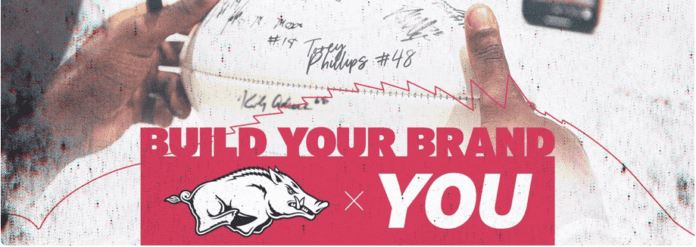Today, the NCAA Board of Governors approved a proposal that allows student-athletes to profit from endorsement and promotional deals. This is a huge change for the industry that’s expected to be approved by all members in January and go into effect for the 2021-2022 season.
“Times have changed and we believe whole-heartedly that college sports need to adapt to keep in step with the times,” said Val Ackerman, co-chair of the Federal and State Legislation Working Group and commissioner of the Big East.
Despite the best intentions of Ackerman and other officials, this ruling accelerates a trend where college sports will ultimately become more about the individual than it is about the team.
It’s a trend the Razorback football program is already getting behind, as the below Tweet shows:
There’s no better place to build your brand than a state where all eyes are on you!
— Arkansas Football Recruiting (@RazorbackFBRec) April 29, 2020
? x ??? pic.twitter.com/sng4U5O7m4
A couple of recruits, three-star Texans Torey Phillips and Jordan Eubanks, absolutely love it. They ReTweeted images from Razorback recruiters that feature the new slogan and their PhotoShopped autographs on a football.
Yessir that Arkansas heat ?@RazorbackFB @DLTough pic.twitter.com/1cAFCadcLM
— ToReYPiILlIpS (@ToreyPhillips3) April 29, 2020
This ruling has a lot of ramifications, many of which will be clarified in the coming months. But there are some key points you should know now: Come 2021-2022, student-athletes will be able profit on third-party endorsement deals. Such opportunities can come from television commercials or social media posts or YouTube pages.
So, if Razorback receiver Treylon Burks wants to co-host his own “Hands Down” podcast in which he talks about life as a star SEC player and potential high NFL Draft pick, he can.
Or, perhaps, Razorback basketball star Moses Moody decides to forego entering the 2021 NBA Draft (ESPN currently projects him to go in the late first round) and host a weekly “Moses Moody Hour” in which he chats with fans and gives tips on how to develop a killer three-point stroke.
***

***
These guys who would have to follow a number of restrictions, including:
- the student-athlete cannot wear apparel identifying their respective schools
- the school can have no part in setting up the endorsement opportunity.
- No promotion of alcohol, tobacco and sports gambling
Athletes will also be allowed to make taxable income from personal appearances such as autograph sessions or even creating their own clothing lines.
Since leaving for the NBA, former Razorback player Daniel Gafford has started his own line, as has Bobby Portis. Had they been allowed to profit off of their names and likenesses while in college, pulling in tens of thousands of dollars over their career, would they have stayed for their junior seasons at Arkansas?
It’s hard to predict how much money Arkansas football and basketball stars could make per year, but it’s likely going to be in the thousands for the All-SEC type performers, according to longtime college football analyst Danny Kanell.
I too feel badly for every college athlete who stands to make some money instead making no money, an absolute American tragedy https://t.co/wlc17G1S58
— Patrick Hruby (@patrick_hruby) April 29, 2020
The NCAA has said these changes will go into place under the following “guiding principles” :
- Ensuring student-athletes are treated similarly to non-athlete students unless a compelling reason exists to differentiate.
- Maintaining the priorities of education and the collegiate experience to provide opportunities for student-athlete success.
- Ensuring rules are transparent, focused and enforceable, and facilitating fair and balanced competition.
- Making clear the distinction between collegiate and professional opportunities.
- Making clear that compensation for athletics performance or participation is impermissible.
- Reaffirming that student-athletes are students first and not employees of the university.
- Enhancing principles of diversity, inclusion and gender equity.
- Protecting the recruiting environment and prohibiting inducements to select, remain at or transfer to a specific institution.
I highlighted the three “principles” which will be especially hard to enforce.
Indeed, the last one about transfers is laughable.
For sure, this ruling will create a feeding frenzy where student-athletes begin transferring more than ever. Why? One big reason: Some college programs have millions of social media followers while others have “only” hundreds of thousands of such followers.
The more followers, the more click throughs on a players’ posts, and the more profit potential. (This is a reason why Malik Monk chose Kentucky over Arkansas.) Programs won’t have to retweet the players’ commercial posts to still give them big boosts in terms of number of followers.
Plus, how can you make it “clear” that compensation for athletics performance is “impermissible”?
The very reason these student-athletes will be able to build their own brands, thus profiting off it, will be through their performance on the field.
What the Big Wigs Are Saying
Val Ackerman, the Big East commissioner, said that schools will likely need to beef up their compliance departments to handle the coming red tape and regulations stacked on what’s already a labyrinthine set of NCAA rules.
According to the Orlando Sentinel, Ackerman said it will be a combination of school staff, NCAA staff and potentially a third party group set up by the NCAA that could help athletes navigate the process.
“The reasons for the guardrails are to address some core concerns,” Ackerman said. “First, we want to make sure our system continued to feature students competing against students and not one where athletes are employees who are paid salaries by their schools. The upside of this is schools will be separated from NIL activities. The payments are to come from third-parties only and school intellectual property will not be allowed in these endeavors.”
***




